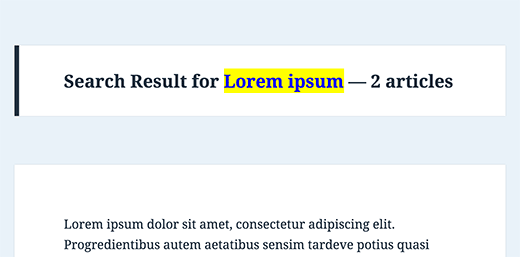Neste tutorial, compartilharemos como você pode adicionar uma função simples à sua página de busca que exibirá o termo de busca e o número de resultados. Este recurso foi um pedido especial de um de nossos usuários por e-mail. Se você quiser que abordemos um tópico, sinta-se à vontade para fazer uma sugestão.

Abra seu arquivo search.php em seu tema e adicione o seguinte código:
<h2 class="pagetitle">Search Result for <?php /* Search Count */ $allsearch = new WP_Query("s=$s&showposts=-1"); $key = wp_specialchars($s, 1); $count = $allsearch->post_count; _e(''); _e('<span class="search-terms">'); echo $key; _e('</span>'); _e(' — '); echo $count . ' '; _e('articles'); wp_reset_query(); ?></h2>
O código acima exibirá algo como isto:
Resultado da busca por twitter — 15 artigos
Você também pode destacar o termo de busca adicionando a classe CSS .search-terms à folha de estilo do seu tema. Aqui está um CSS simples para começar:
.search-terms {
background-color:yellow;
color:blue;
}
Esta é apenas uma das coisas legais que você pode fazer para sua Página de Busca ao personalizá-la. Você também pode destacar termos de busca nos resultados, e até mesmo adicionar um recurso de busca por categoria à sua busca no WordPress.
Fonte: Michael Martin





Aniruddh
Posso usar este código no arquivo sidebar.php? Como preciso mostrar o termo de busca e a contagem de resultados na barra lateral. Por favor, ajude.
Marco
thanks a lot for this snippet!
de acordo com o codex do wp, a função wp_specialchars está obsoleta. diz que você deve usar esc_html em vez disso.
atenciosamente,
marco
Marco
Da próxima vez darei uma olhada mais atenta nos comentários. CHADHAYTON já postou um link de como você pode lidar com isso agora.
Henry
echo $wp_query->found_posts;
Adicionar isto no topo da sua página de busca exibirá o número de posts encontrados para uma busca específica.
echo get_search_query();
Isto exibirá o termo de busca (inserido na caixa de busca pelo visitante do seu site).
timer_stop(1);
Isto exibirá o tempo que levou para executar a busca.
Juntos, você pode exibir algo como:
Sua busca por “café em grão” retornou “16” posts em “0.87” segundos.
jameslhf
Thank you Henry, that helped me!
Prasanna
Obrigado Henry. Isso me ajudou muito.
chadhayton
É difícil dizer a idade deste post, mas o WordPress 3.1 inclui uma maneira de obter o total de resultados da busca que não requer uma consulta separada:
http://codex.wordpress.org/Creating_a_Search_Page#Display_Total_Results
Chris Murphy
Uau. É muito mais simples do que isso contar os resultados da busca do WordPress, aqui:
global $wp_query; $count = sizeof( $wp_query->posts ); echo"<pre>"; //var_dump($wp_query);// The WP Query Object var_dump($wp_query->posts); // The WP Query Object's 'posts' property (note the plural) echo"</pre>";Se você inserir esse trecho no seu template de busca, ele exibirá as propriedades da variável ‘$wp_query’, especificamente a propriedade ‘posts’ do objeto. Este é um array que armazena uma coleção dos posts retornados pela consulta de busca, com os quais você pode fazer várias coisas assim que acessá-lo, incluindo (*tambores*), *contar* o número de posts nesse array usando a função ‘count()’ ou ‘sizeof()’ do PHP.
Equipe Editorial
Seu código está um pouco cortado. Há alguma maneira de você nos enviar o trecho por e-mail para que possamos testá-lo e escrever sobre ele. Obviamente, o crédito total será dado a você.
Admin
Ilya
Chris,
Isso não vai funcionar. O objetivo é descobrir o número total de resultados que correspondem à consulta — não o número atualmente buscado. Se houver mais resultados do que cabem em uma página, seu código obterá apenas o número de elementos em uma página.
pete
Os resultados da pesquisa são algo pessoal para o usuário, então é bom que eles recebam muitas informações.
basilakis
So the code is right or not?
I see Konstantin has some point about the query, but the comments “ate” the results!
Equipe Editorial
Este código está correto. Funciona, o único problema que ele aponta é que também pode ser feito de outra forma. Usamos este código no site de um cliente e ele funciona.
Admin
Konstantin
Boa ideia. Má execução.
Por que diabos você iria querer traduzir uma tag span???
E a minha favorita:
_e('');Hã??Por que você iria querer consultar a mesma busca duas vezes?
Não faz sentido nenhum.
Mas eu não quero odiar, é assim que deveria ser feito (na minha humilde opinião):
post_count); ?>
Tom
Eu realmente não penso muito na minha pesquisa na página. Algo assim é ótimo porque torna a página mais personalizada.